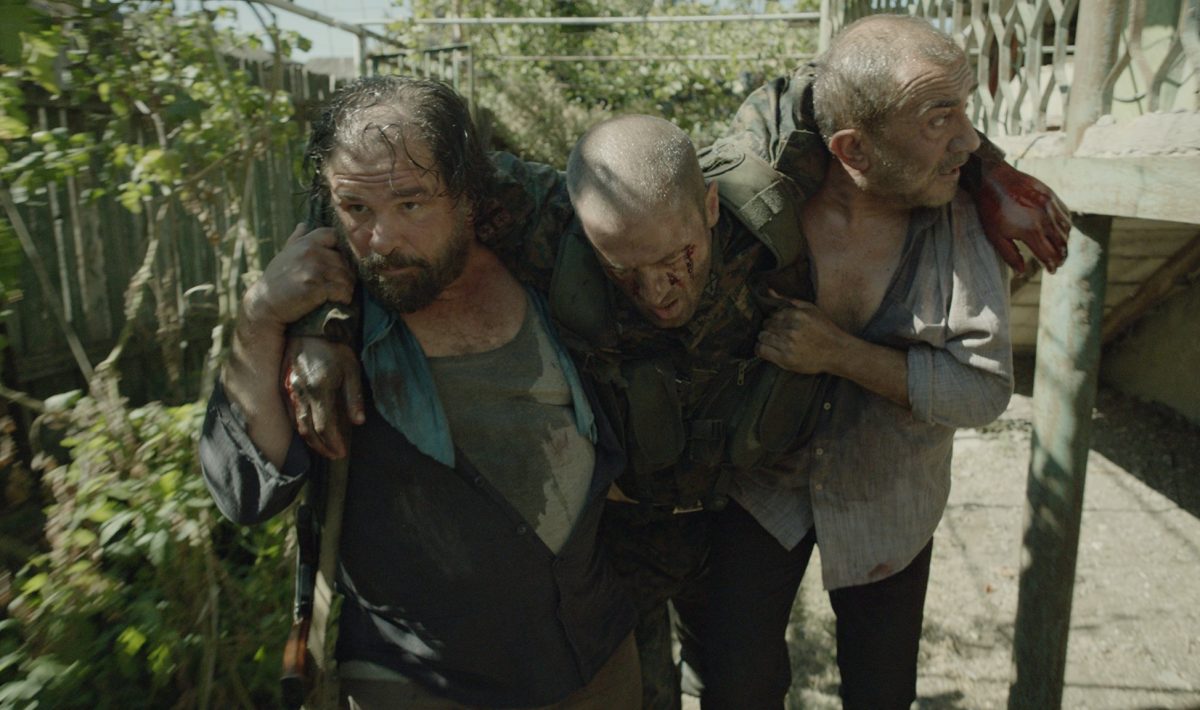Dito Tsintsadze’s Shindisi – shown in the International Competition of the Warsaw Film Festival – is a film that has a chance to appeal not only to Warsaw audiences who have a clear weakness for Georgian cinema (I remind you of Zaza Urushadze’s Tangerines from 2013), but can also gain a significant clout to appeal to the public in the widely understood West.
You should be aware that the Georgian submission for the Academy Award strongly chooses its perspective of Georgian struggle to gain full independence from Russia and the recovery of lost territories (Georgia conflict with pro-Russian South Ossetia is still warm). Do not expect objectivity from the film so fierce in its romantic spirit of patriotism.
However, Tsintsadze remains gentle – as long as one can be gentle when talking about the uneven war and its bloody effects – also in relation to Russian soldiers. They are not monsters, but they were made of flesh and blood, and maybe only they “love” Georgia too eagerly to “let it go”.
Shindisi is a story based on real events – or rather a war story about the heroic deeds of Georgian civilians and an ardent spirit that burns not only in young soldiers. Well, Tsintsadze’s work is viewed as if the oral lore has been transformed into a visual medium. The film has something of a song of praise for – as the director himself indicates – the Georgian national spirit and the strength of the sense of community.
The long, naturalistic fight scene is also noteworthy. This is what death during the war looks like – it’s sudden, unexpected, inhuman and full of fear. The director focuses on the collective, stopping only for a moment on each of the individuals. Everyone who stays under the camera’s gaze for a longer time will almost certainly die. Although viewers will not achieve projection-identification with any of the fighters in this way, Tsintsadze can evoke empathy by showing nameless deaths – here he will throw a detail, there he will cunningly squeeze viewer’s heart. Fortunately, despite using simple dramatic props, the artist never once crosses the kitsch line, which is so easy in stories about war.
Of the 22 soldiers who fought in the battle of Shindisi, only 4 will survive. The inhabitant of a nearby village will save their lives and risk his own skin in the process. He couldn’t run away from home because he didn’t want to leave his sick wife. His courage is not reckless, but rather quiet, resulting from necessity, from a sense of duty towards the family and dying young people (towards the nation). The director forges his characters from bronze – here the emotions are secondary, the heightened image really counts.
How it is that such a zealous film works on the viewer so well? It seems that the sympathy the viewers will definitely feel about Shindisi is due to our internal need for myth. A myth that would restore faith in humanity and in sense of patirotic attitudes. Like in oral storytelling or bard song, Tsintsadze’s movie consists of real and fictitious elements. What would happen if you wiped all the fiction? Only death would remain, the value of which is quickly blurred.
Although I am far from respecting the attitude taken straight out from the
nineteenth-century national romanticism[1], I
cannot deny Georgians that they can construct their stories in an extremely
engaging way. And although I would prefer to watch the gentle love for the
country, which was presented, for example, in Tangerines, I understand the need that Shindisi grew out of – the need to believe in the national case and
the rightness of a sacrifices at the altar of a nation.
[1] For this reason, I will not admire Shindisi. I assume that the attitudes presented in the film will hit the fertile ground among those who practice turbopatriotism. The myth will lose its human value.







